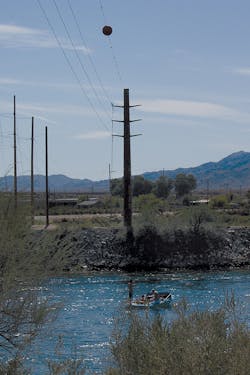Two hours from Las Vegas, in the Mojave Desert, sits a city near the California and Arizona border. Needles, California, is a city of fewer than 5,000 residents, located on historic Route 66. For years Needles struggled economically. Now the city is back on its feet, touting some of the lowest electric rates in the country. WAPA helped to bring about that change.
Needles is probably best known for being home to Charles M. Schulz, creator of Peanuts, from 1928-1930. Schulz even honored the city by making it the official home of Snoopy’s brother Spike. From the 1920s to the 1960s, Needles enjoyed being a major stop on Route 66, with many visitors and travelers coming through as a result.
This changed for good when Interstate 40 was built. With highway traffic now circumventing the city, the economy experienced a downturn. In 2010, according to the U.S. Census, the median household income in Needles was less than $30,000, with more than 28% of the population living below the poverty line.
In 2007, Needles Public Utility Authority (NPUA) recruited Jack Lindley to serve as electric line crew supervisor and fix the city’s electrical system. Upon arriving, Lindley determined that it needed substantial work. That is when he reached out for help. “Contacting WAPA was the smartest thing I’ve ever done,” Lindley said.
Taking Action
Needles was not only struggling economically due to a lack of tourism; its power was expensive and flowing across an unstable system with lines that were more than 60 years old. This was a significant problem as temperatures in Needles are some of the highest in the world, approaching 120°F to 125°F in the summer. Air conditioning is crucial to the residents and is also a big draw on power, causing outages when the residents needed it the most.
“Our outages were systemwide,” Lindley said. “We would have the entire system out of power for 12 to 24 hours at a time. It was unacceptable. We were totally collapsing as a utility.”
Extended periods without air conditioning caused life-threatening issues for residents and posed particular threats to senior citizens and small children. Once NPUA partnered with WAPA, the outages were reduced almost immediately, by 96% in Lindley’s estimation.
The cost of power was the result of Needles purchasing from a single source. Once NPUA started working with WAPA, it not only increased the system’s reliability, it allowed the city to purchase power from multiple vendors.
“We built a new transmission line from a WAPA substation in Arizona and started getting power from there,” Lindley said. “WAPA took over our load balancing and power purchases, and we went from having access to one vendor to having access to around 27 vendors.”
John Paulsen, Desert Southwest (DSW) supervisory energy management and marketing specialist, says that WAPA entered into transactions with suppliers based on who has the best price monthly, daily or hourly.
“The power rate Needles pays is based on whatever the wholesale market for power is trading for,” Paulsen said. “It’s a very helpful system, because WAPA has the staff and the enabling agreements already in place to make these transactions for the city from a wider pool of potential suppliers than they could practically manage on their own.”
Increasing Efficiency
Needles is now a Parker-Davis Project firm electric service customer. The city began using energy scheduling services from DSW in 2003, and its load was moved to DSW’s balancing authority in 2008.
In preparation for the balancing authority move, the DSW Energy Management and Marketing Office (EMMO) worked with Needles to help establish Network Integrated Transmission Service (NITS). NITS uses multiple generators at different points, similar to a spider’s web, to serve various load points or load that’s not physically interconnected with WAPA transmission lines. This approach gives customers flexibility to dispatch and regulate their resources as well as to deliver to their loads, even in the event of transmission outages.
“The city immediately benefited from being able to use short-term energy market purchases at a time when the price of wholesale power was declining,” Paulsen says.
In January 2014, Needles joined an aggregated group of DSW preference customers for which the DSW EMMO also provides portfolio management services. As a member, Needles has been able to realize further savings through the sharing of energy resources and administrative costs within the group, an opportunity WAPA affords all of its customers.
“Needles has been an excellent partner in supporting WAPA’s mission, and the work we are able to do on the city’s behalf provides benefits for all of DSW’s customer base,” Paulsen said.
Since they began working with WAPA, the city’s power rates have dropped 66%. Previously, customers were paying 15.8 cents per kilowatt-hour; as of January 1, their rate is 4.65 cents per kilowatt-hour. “We were able to reduce costs like that because we partnered with the right partner, and the right partner was WAPA,” Lindley said. “The entire economic situation of the community has changed more in the last 12 months than it had in the previous 50 years.”
Before working with WAPA, Needles’ annual purchased power was about $4.2 million; today the same amount of power is purchased for around $1.8 million. That results directly in lower costs for the ratepayers.
Success Story
Small utilities such as NPUA have the ability to directly affect their communities, saving residents money and giving back to the ratepayers. Lindley describes the community as “underemployed.” When an electric bill drops by $100, that is an extra $100 that every household can use to provide for their families to make a house payment, or purchase food and clothing for their children.
Lindley says that he cannot understate the value of public power and what it brings to his community.
“The city of Needles is a phenomenal success story,” says Ron Moulton, senior vice president and DSW regional manager. “It is tribute to WAPA’s energy professionals who view our customers as partners and work with them each and every day to ensure the safe, secure, reliable and affordable delivery of energy and transmission services that communities depend on.”
Lindley and the community are excited about the growth that the partnership between WAPA and NPUA has provided to the residents of Needles. “WAPA absolutely needs to be there for small utilities like us,” Lindley said. “In 42 years in this industry, I have never had a relationship with any utility that is as positive as this. It would be impossible to overstate the value of WAPA to this city.” ♦
Travis Weger is a public affairs specialist for Western Area Power Administration.
About the Author
Travis Weger
Public Affairs Specialist
Travis Weger is a public affairs specialist for Western Area Power Administration.


